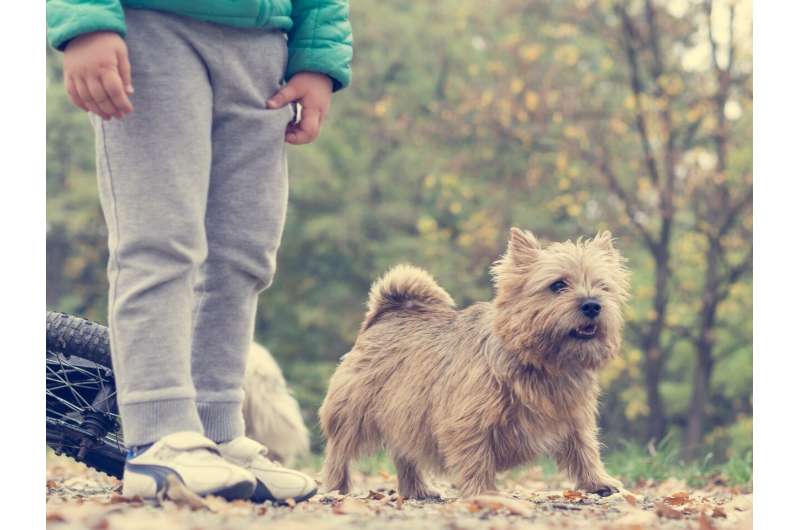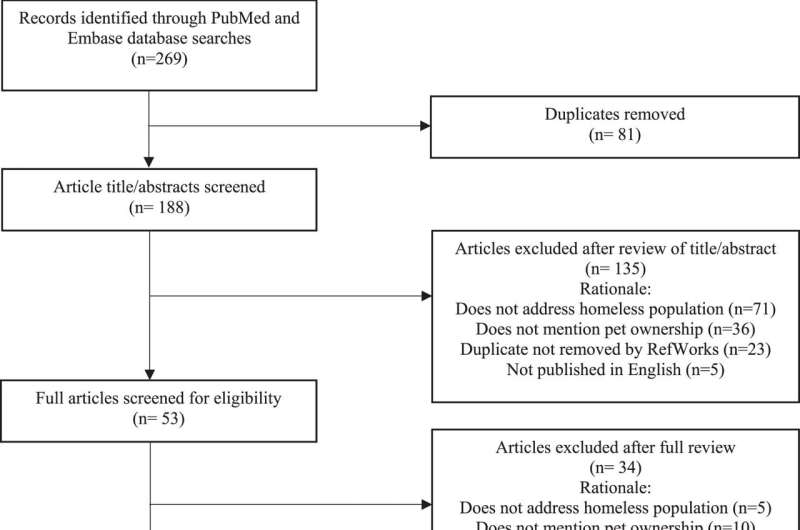This article has been reviewed according to Science X's editorial process and policies. Editors have highlighted the following attributes while ensuring the content's credibility:
fact-checked
proofread
Study reveals five common ways in which the health of homeless pet owners and their companions is improved

A rapid scoping review has been conducted, which reveals five common ways in which the health of homeless pet owners and their companion animals is improved.
Ten percent of homeless people keep pets. However, little information exists on specific intervention strategies for improving the health of homeless people and their pets, who are often the only source of unconditional love or companionship in their lives.
The study, published in the Human-Animal Interactions journal, found that the most common ways in which homeless people and their pets are supported to live healthier lives include free veterinary clinics, joint human/animal clinics, stigma reduction, interdisciplinary relationships, and pet-friendly lodging.
Lead authors Dr. Michelle Kurkowski and Dr. Andrew Springer said research on homeless people and their pets showed significant heterogeneity, but they stress that further program intervention is needed to recommend intervention best practices.
Promising avenues for evaluating interventions and improving health
They suggest that joint human/animal clinics and interdisciplinary partnerships are promising avenues for evaluating interventions and improving health outcomes.
A study by Ramirez et al (2022) that investigated 44 homeless pet owners in Seattle, U.S., for example, found that 61% of respondents were interested in health care for their pets, compared to 43% for themselves. Furthermore, 86% indicated they would attend a joint veterinary/human health clinic, with convenience frequently mentioned.
Studies that the researchers drew upon for their findings—from the PubMed and Embase databases—include those focused on homeless pet owners across the U.S., Canada, and the UK.
Dr. Kurkowski wrote the paper while at the University of Texas Health Science Center at Houston School of Public Health (UTHealth) but is now a Veterinary Medical Officer for the USDA Animal and Plant Health Inspection Service.

A source of friendship and physical safety
She said, "Research has shown that companion animals are a source of friendship and physical safety, and homeless persons with pets report significantly lower rates of depression and loneliness compared to non-pet owners."
"Studies show that pet owners experiencing homelessness are also subjected to unique challenges in caring for both themselves and their companion animals. Individuals, for instance, are often forced to choose between accessing lodging and keeping their pets with them."
"Similarly, our review reveals that this group is less likely to utilize needing assistance, such as health care or career services, potentially due to difficulty using public transportation of lack of safe places to leave pets."
However, Dr. Kurkowski and Dr. Springer said that despite the growing body of literature on both the benefits of pet ownership for the unhoused community—as well as the needs and challenges that homeless pet owners and their pets face—little attention has been given to developing interventions to address the challenges facing this group.
More comprehensive and effective care package
Dr. Springer, associate professor in the Department of Health Promotion and Behavioral Sciences at UTHealth, "Our purpose was to describe the study designs, measurements, and outcomes of relevant primary research studies to identify knowledge gaps in the body of literature on this topic."
"Additionally, common intervention characteristics were highlighted to create a 'road map' of prior interventions to assist individuals interested in creating similar programs."
"The ultimate goal of this assessment was to summarize key intervention strategies for pet owners experiencing homelessness to help direct future funding, research, and outreach efforts among this unique population."
The researchers conclude that a more comprehensive and effective care package for homeless people and their pets will require the combined efforts of health care providers, social workers, animal welfare workers, and governmental and nonprofit organizations to develop innovative One Health solutions for the challenges currently facing this population.
More information: Exploring Strategies for Pet Owners Experiencing Homelessness: A Rapid Scoping Review, Human-Animal Interactions (2024). DOI: 10.1079/hai.2024.0002




















